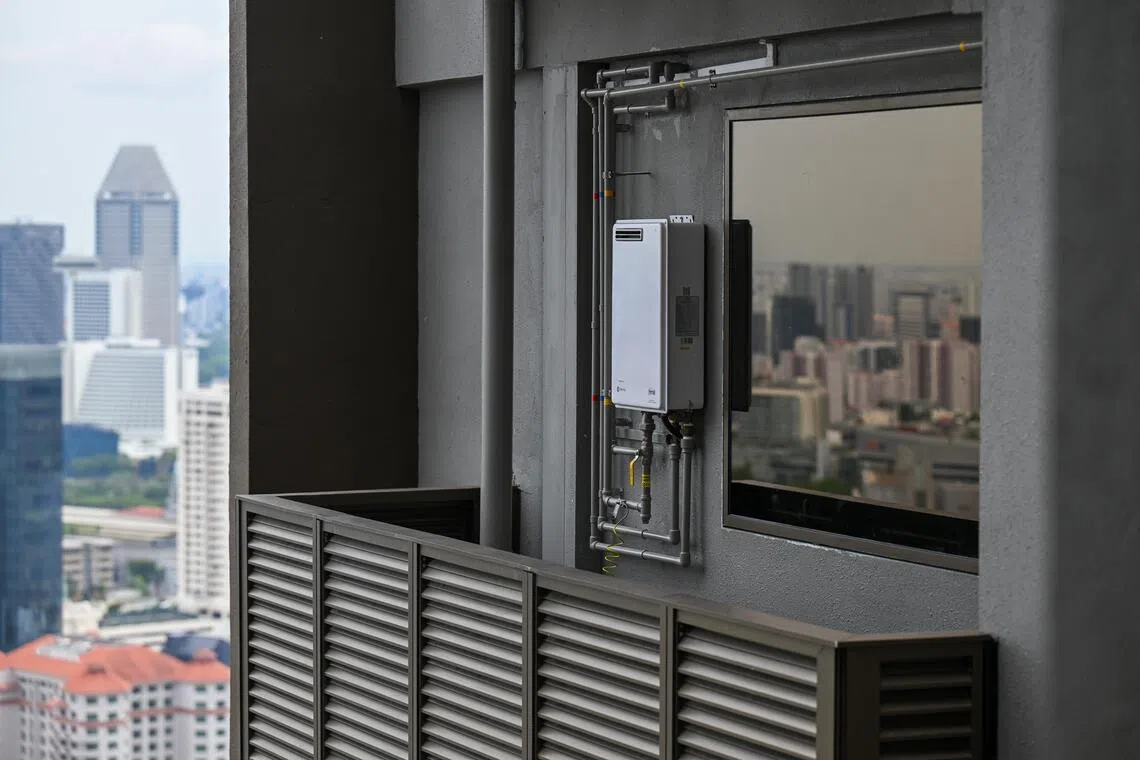Jump in condos in Singapore adopting gas water heaters
Sign up now: Get ST's newsletters delivered to your inbox

Instantaneous gas water heaters are now used in more than 210,000 households, or 14.3 per cent of all homes.
ST PHOTO: SHINTARO TAY
- Gas water heater uptake in Singapore condos is rising, with 70% installation in new private homes due to energy efficiency.
- NEA's labelling scheme (effective April 2025) and energy efficiency benefits drive demand, despite higher upfront costs, according to City Energy.
- NUS research shows gas heaters emit significantly less CO2 than electric ones.
AI generated
SINGAPORE – Condominium developers in Singapore are driving an uptake in gas water heaters, with 70 per cent of new private homes with town gas connections having such heaters installed.
The installation of gas heaters in completed projects is up 210 per cent for the two-year period between 2023 and 2025, compared with the 2020 to 2022 period, according to figures from City Energy.
Currently, more than 360 condo developments are equipped with gas water heaters, the company said.
Formerly known as City Gas, City Energy is Singapore’s only provider of piped town gas – a man-made fuel composed mainly of hydrogen and methane.
Instantaneous gas water heaters are now used in more than 210,000 households, or 14.3 per cent of all homes here, the Keppel Infrastructure Trust subsidiary said.
Of these, about 110,000 are private homes, with HDB units numbering about 100,000.
The surge in interest comes as the National Environment Agency (NEA) extended its Mandatory Energy Labelling Scheme
From April 2026, such heaters sold here must be registered with NEA and meet the requirements of the scheme, with models that fail to meet at least a one-tick energy rating no longer allowed to be sold.
City Energy attributed the rise to consumers seeking more energy-efficient appliances, citing data on the NEA website, which points to gas water heaters as a more economical alternative than their electrical counterparts.
By switching from a one-tick electric storage water heater to a four-tick gas heater, households could save up to $1,200 over 10 years, the estimated lifespan of an average water heater, NEA said.
Among the condos that have installed gas water heaters are Rivercove Residences in Sengkang and Kovan Regency in Hougang, both developed by Hoi Hup Realty.
Mr Koon Wai Leong, general manager of Hoi Hup Realty, said the property developer looks at features that can add long-term value for home owners when planning new developments.
“Gas water heaters stand out because they are more energy-efficient, and space-saving. With the national labelling scheme now in place, we see more buyers asking for appliances that meet higher energy standards,” he said.
More consumers are now making energy efficiency a priority when choosing a water heater, said City Energy chief executive Perry Ong on Nov 5.
Speaking to reporters at a briefing held at The Landmark – an upcoming condo in Chin Swee Road, which also has installed gas heaters for its 396 units – Mr Ong noted that 16 of the 21 gas water heaters currently available here had achieved four out of five ticks under NEA’s labelling scheme, the highest rating attained by water heaters on the market here.
While 111 of the 129 four-tick water heaters here are instantaneous electric heaters, the company noted that gas heaters offer other advantages over these models, such as stronger flow rates and the ability to deliver hot water to multiple points around a home from a single heater.
A study commissioned by the company – conducted by Associate Professor Lee Siew Eang from NUS’ College of Design and Engineering – found that gas water heaters emit 0.19kg of carbon dioxide per kilowatt-hour, about half that of electric water heaters.
This translates to electric storage water heaters emitting an estimated 400kg of carbon per user annually, compared with the 80kg emitted by gas models.
Prof Lee noted that the higher emissions for electric storage water heaters are in part due to the generation of electricity by burning gas.
There are currently fewer gas water heaters than electric ones on the market here, with gas heaters accounting for just 21 of the more than 200 registered models listed on NEA’s website.
Instantaneous gas water heaters are also typically more expensive than the electric alternatives, with most such heaters sold on the City Energy website costing between $550 and $1,846.
In comparison, an electric instantaneous water heater can go for as little as about $100.
However, City Energy tries to provide a more compelling option for home owners by providing a one-stop service for the installation of the heater and its associated piping, said Mr Soh Guan Hong, the firm’s senior vice-president and head of its residential sales group.
“We provide that one-stop solution, and by bringing it all together, we are able to bring the cost down as low as possible,” he said.



